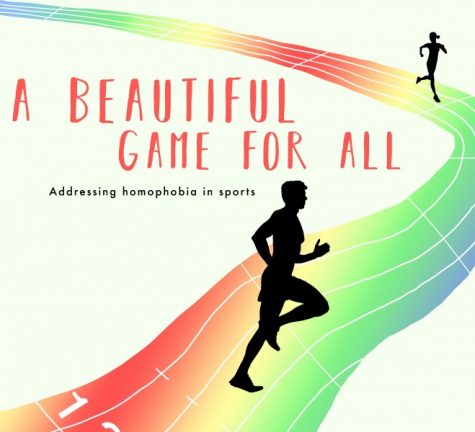A beautiful game for all: addressing homophobia in sports

LGBT history month occurs annually during the month of October. The world of sports is still a largely conservative body in terms of sexuality and gender expression, which makes celebrating the accomplishments of LGBTQ+ athletes difficult during this month. Homophobia within men’s sports in particular is still so invasive that it affects the experiences of athletes and fans alike.
New Orleans Saints head coach Sean Payton stated at the 2017 NFL Annual Meeting that the team would not have any issues with having an openly gay or bisexual player, due to “leadership” provided by the players themselves. This is a considerable statement given the magnitude of the event at which it was said and because it speaks to the level of confidence that Payton has in his players.
The example, however, put forth by the Saints has not yet spread to every fan, as seen with the experience of Jesse Hernandez, the first ever male member of the Saint’s cheerleading squad. Hernandez is one of only three male cheerleaders in the entire NFL. Instead of being regarded as the pioneer that he is, Hernandez dealt with discriminatory online comments on the night of his NFL debut.
In 2014, University of Missouri defensive end Michael Sam made history as the first openly gay football player to be drafted into an NFL team when he joined the then-St. Louis Rams. The public support that Sam appeared to have initially, however, soon turned sour with accusations from Sam’s supporters that teams were discriminating against him due to his sexuality.
The homophobic abuse that Sam faced had such an impact on him that he retired from football, a sport that he had played since before high school, due to the damage it did to his mental health.
It would be naive to think that homophobia within sports is a uniquely American problem. The Premier League, the top level of English soccer clubs, brought representatives from all 20 of its teams together in a campaign entitled Kick It Out in February of 2018. This campaign aimed to abolish the misconception that LGBTQ+ fans and players are not welcome to partake in Premier League matches. One of the most common ways homophobia persists in the sport, despite the fact that the League formally banned it in 2007, is through the shouting of slandering phrases during protests.
Kick It Out is more active than past measures by the Premier League to address homophobia because of how fans are an integral facet of the campaign. For example, fans are encouraged to discourage homophobic chants should they arise around them, and to report any offensive remarks to their clubs or stewards at the stadium. There is an even an app that patrons can use to confidentially report online or in-person problems. The campaign calls the homophobic chanting at matches nothing less than abusive and discriminatory.
Héctor Bellerín, a right-back defender for the English soccer club Arsenal, disclosed in a 2018 interview the difficulty for any player to come out as gay in the sport. Bellerín recognizes that even though he tries to not let these remarks bother him, they are still abusive. The fact that homophobia is so deeply ingrained within the culture of sports that a player has gone out of his way to address it in an interview is very telling.
Hector Bellerin says it's 'impossible anybody could be openly gay in football' after taunts over his fashion style https://t.co/J1ClpTClV3 pic.twitter.com/n5rloVErAz
— B/R Football (@brfootball) September 8, 2018
Sports as a whole would not exist without the support of fans. The institution of the sports world is ingrained in the “rally around the team” mentality. This beautiful, mutualistic relationship is not able to exist, however, if one side is not able to live as their authentic selves. Though realizing the fragility of the human experience is difficult in the world of men’s sports, the future of inclusivity in sports depends on it.
Your donation will support the student journalists of Tulane University. Your contribution will allow us to purchase equipment and cover our annual website hosting costs.



Leave a Comment